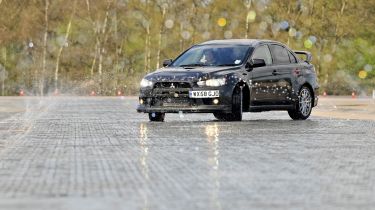Mitsubishi EVO X FQ360
Final report: We visit one of UK’s top test tracks to see just how capable our Lancer is
Believe it or not, what you’re looking at here is a serious scientific experiment. Honest. Having run the Mitsubishi Evo X for a number of months, I’ve been itching to try out its array of traction and stability gizmos – and Prodrive’s Performance Centre in Kenilworth, Warks, was the perfect place to do so.
A grippy race track was out of the question, as I didn’t want another bill for a set of new tyres. Prodrive’s expert engineers are famous for their work on road car stability systems, which is why they have their very own low-grip test facility. When covered in water, it offers a super-slippery surface, not unlike ice. That’s ideal, because even on a fast country road I feel as if I’m barely scratching the surface of the Evo’s abilities.
It has features such as Active Stability Control (ASC), Active Yaw Control (AYC) and an Active Centre Differential (ACD). Collectively, these vary the amount of torque sent to the front, rear, inner and outer wheels, maximising traction and helping to pull the car back on to line if it starts to slide. So it seems a shame not to test them. Likewise, I wanted to see what difference the three settings on the Lancer’s active differential – tarmac, gravel and snow – made to the experience.
The first surprise of the day was that with all the systems turned on, the Evo was benign and predictable on the skid pan, understeering gently at the limit. Even with big steering angles and lots of throttle, the back refused to step out, as the ASC, AYC and ACD kept the car in shape on the slippery surface.
I used the handbrake to artificially upset things briefly, but as soon as I applied the throttle, the front wheels pulled the car back into line safely.
Playing with the differential settings manually brought the second surprise. Although these can change the way power is distributed between the front and rear wheels, the Evo X can tell within milliseconds what sort of surface it is on, automatically selecting a mode for itself. On the Prodrive ice circuit, it again understeered mildly at the limit, whether it was in tarmac, gravel or snow mode. It seemed there was no fooling the car’s sensors!
However, turn the stability control off and the Mitsubishi is a riot. As you can see, you can achieve four-wheel drifts, like rally legend Tommi Makinen used to do in his WRC Evo VI. And it’s easy to balance slides with the Evo X’s responsive engine and razor-sharp steering – I could have played all day!
So what was my conclusion? Well, the Evo X is more capable than any driver will ever need. Its computer-controlled chassis is amazingly stable and safe – but this car is also fun. In fact, while my drive back to London was less dramatic, the handling still brought a smile to my face.
It’s not the great all-rounder Mitsubishi would have you believe – economy is poor, it’s too noisy on motorways and the finish is iffy. But as a master of going faster, the Evo X is still at the top of its game.
Second opinion
I can forgive the Evo X’s harsh ride, as well as its questionable styling and lacklustre interior quality. What I can’t ignore, though, are the dismal fuel returns. Anyone who runs a high-performance car such as this will be used to big bills at the petrol pumps – they will put up with them on the proviso that the model isn’t so thirsty once you reach motorway cruising speeds. But the Mitsubishi’s short fifth gear means this is impossible – so I’m always left with an empty wallet.
Graeme Lambert
Assistant consumer editor






